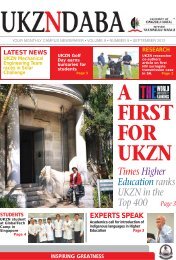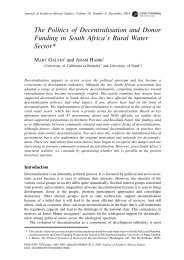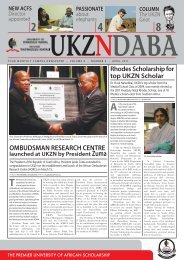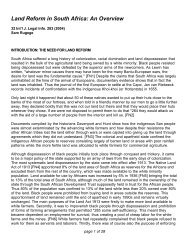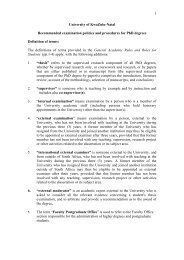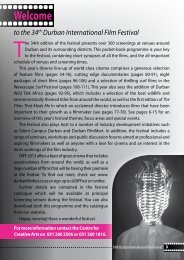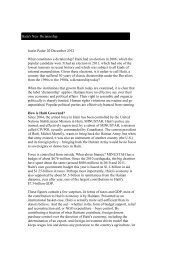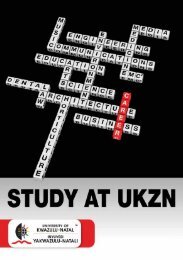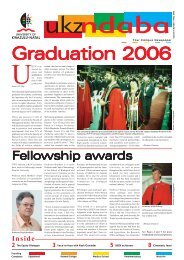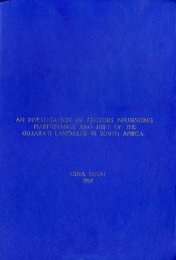universit y of kw azulu-na tal research repor t 2008/2009 - UKZN ...
universit y of kw azulu-na tal research repor t 2008/2009 - UKZN ...
universit y of kw azulu-na tal research repor t 2008/2009 - UKZN ...
- No tags were found...
You also want an ePaper? Increase the reach of your titles
YUMPU automatically turns print PDFs into web optimized ePapers that Google loves.
HIV and AIDSRESEARCH FOCUS AREASAs the pre-eminent academic institution at the epicentre <strong>of</strong> the HIV epidemic in South Africa, <strong>UKZN</strong>has taken up the challenge <strong>of</strong> providing leadership in response to HIV and AIDS, and <strong>of</strong> undertaking<strong>research</strong> to enhance and strengthen the broader socie<strong>tal</strong> response to the epidemic. The leadershiprole in <strong>research</strong> and a groundbreaking comprehensive AIDS programme for students and staff serve ascornerstones <strong>of</strong> <strong>UKZN</strong>’s AIDS Plan.Partnerships include networking and collaborating with AIDS <strong>research</strong>ers within <strong>UKZN</strong>, at otherSouth African academic institutions and around the world. In developing partnerships at a global level,<strong>UKZN</strong> strives to nurture inter<strong>na</strong>tio<strong>na</strong>l institutio<strong>na</strong>l partnerships such as the long-standing relationshipwith Columbia University and Harvard University in the United States. The world-class <strong>research</strong> centresin HIV and AIDS and TB have ma<strong>na</strong>ged to attract funding from inter<strong>na</strong>tio<strong>na</strong>l organisations such asthe Howard Hughes Medical Institute, the Wellcome Trust and Natio<strong>na</strong>l Institutes <strong>of</strong> Health (NIH),the European Union (EU) and DfID. <strong>UKZN</strong>’s AIDS Strategic Research Focus includes several wellestablishedHIV <strong>research</strong> groups and projects, including the following:HIV Pathogenesis Programme (HPP)The HIV Pathogenisis Programme (HPP) comprises a leading <strong>research</strong>group in the Doris Duke Medical Research Institute led by virologistPr<strong>of</strong>essor Thumbi Ndung’u, who holds the DST/NRF Research Chair inSystems Biology <strong>of</strong> HIV/AIDS. Key inter<strong>na</strong>tio<strong>na</strong>l collaborators includePr<strong>of</strong>essor Bruce Walker <strong>of</strong> Harvard Medical School in the United Statesand Pr<strong>of</strong>essor Philip Goulder <strong>of</strong> the University <strong>of</strong> Oxford in England.This programme conducts <strong>research</strong> into HIV immunology, virology andpathogenesis. HPP has a vibrant post-graduate training programme.Over the past three years, members <strong>of</strong> the group have co-authoredover 30 articles which have appeared in leading jour<strong>na</strong>ls such as Nature,New England Jour<strong>na</strong>l <strong>of</strong> Medicine, Jour<strong>na</strong>l <strong>of</strong> Virologyand the Jour<strong>na</strong>l<strong>of</strong> Infectious Diseases. There are four local principal investigators in thegroup, three postdoctoral fellows and about 20 postgraduate students.Centre for the AIDS Programme <strong>of</strong> Research inSouth Africa (Caprisa)high rates <strong>of</strong> HIV infection in young people as a prelude to thecurrent Reducing HIV in Adolescents (RHIVA) trial <strong>of</strong> an innovativeconditio<strong>na</strong>l cash transfer strategy to prevent HIV in this importantgroup.❉ Microbiocides. In the CAPRISA 004 trial, an antiretroviralmicrobiocide, Ten<strong>of</strong>ovir, was investigated to assess its potential inpreventing HIV infection in women during sexual intercourse. Resultsreleased to a world wide audience in 2010 were highly encouragingand received inter<strong>na</strong>tio<strong>na</strong>l applause. Follow up action is takingplace at present to map out the way forward for the use <strong>of</strong> theTen<strong>of</strong>ovir microbiocide❉ HIV pathogenesis and vaccines: Acute HIV infection (Caprisa002) is being investigated to generate new knowledge on how viraland host factors impact on the risk <strong>of</strong> HIV and its <strong>na</strong>tural progressio<strong>na</strong>s a key contribution to vaccine development and testing.❉ HIV and TB treatment. Clinical trials such as the SAPiT trial arebeing conducted to address the key questions and challengesfacing co-treatment <strong>of</strong> HIV and TB.Caprisa is a multi-institutio<strong>na</strong>l team led by Pr<strong>of</strong>essor Salim Abdool Karim,undertaking <strong>research</strong> on HIV epidemiology, pathogenesis, preventio<strong>na</strong>nd treatment. The Centre was established in 2002 under the NIHfundedComprehensive Inter<strong>na</strong>tio<strong>na</strong>l Programme <strong>of</strong> Research on AIDS(CIPRA) by five partner institutions – the University <strong>of</strong> KwaZulu-Na<strong>tal</strong>,University <strong>of</strong> Cape Town, University <strong>of</strong> the Western Cape, the Natio<strong>na</strong>lInstitute for Communicable Diseases, and Columbia University inNew York. Caprisa is a desig<strong>na</strong>ted UNAIDS Collaborating Centre forHIV Prevention Research. The CIPRA grant served as an importantca<strong>tal</strong>yst for Caprisa which e<strong>na</strong>bled it to become one <strong>of</strong> the leadingAIDS <strong>research</strong> organisations in South Africa.Caprisa’s main goal is to undertake globally relevant andlocally responsive <strong>research</strong> which contributes to understandingHIV pathogenesis, prevention and epidemiology as well as the linksbetween tuberculosis and AIDS care.To achieve this goal, Caprisa conducts <strong>research</strong> in four mainscientific programmes: HIV pathogenesis and vaccines; HIV and TBtreatment; microbiocides, and prevention and epidemiology, each witha focused set <strong>of</strong> projects and at least one pivo<strong>tal</strong> study:❉ Prevention and Epidemiology. Several descriptive studies havebeen undertaken at the Vulindlela Research Centre near Howick tobetter understand epidemiology, risk factors and vulnerability toA fifth area <strong>of</strong> <strong>research</strong> on the prevention <strong>of</strong> mother-to-child transmissionis conducted mainly in partnership with other Centres.Africa CentreBased in Hlabisa in rural northern KwaZulu-Na<strong>tal</strong> and the DorisDuke Medical Research Institute in Durban, this Centre conductscommunity-based <strong>research</strong> on HIV epidemiology, prevention andtreatment. Major areas <strong>of</strong> <strong>research</strong> at the Africa Centre, led by Pr<strong>of</strong>essorMarie-Louise Newell, are demographic surveillance and the role <strong>of</strong>breast feeding in mother-to-child transmission <strong>of</strong> HIV. The Centre,with core funding from the Wellcome Trust, hosts a large demographicand health surveillance system with annual household and individualsurveillance <strong>of</strong> 90 000 members <strong>of</strong> 11 000 households.The Africa Centre partners with the local Department <strong>of</strong> Health inthe Hlabisa HIV Treatment and Prevention Programme – since 2004more than 11 000 people have been initiated on treatment in one <strong>of</strong> 17primary health care clinics.Comprehensive antiretroviral therapy (ART) coverage aims toreverse the substantial increase in HIV-related deaths in populationswith high HIV prevalence.Using the data from its demographic surveillance system, the10 <strong>UKZN</strong> Research Report // <strong>2008</strong>/<strong>2009</strong> <strong>UKZN</strong> Research Report // <strong>2008</strong>/<strong>2009</strong> 11



